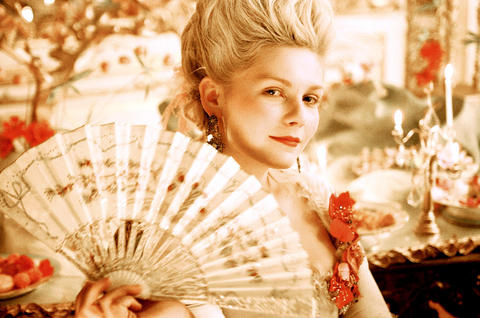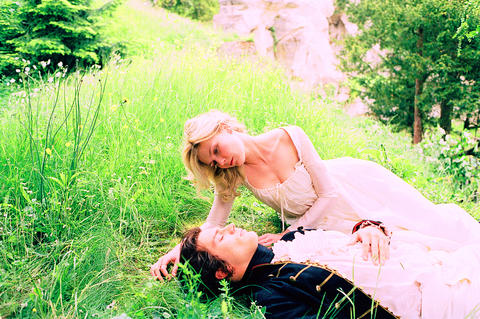The opening lines of Natural's Not in It, by the Gang of Four, are the first words in Sofia Coppola's Marie Antoinette, and they suggest one of the film's paradoxical themes: The pursuit of sensual delight is trivial compared with other undertakings - just as "the problem of leisure" is surely more of a privilege than a burden - but pleasure is also serious, one of the things that gives life its shape and meaning.
It may be tempting to greet Marie Antoinette with a Jacobin snarl or a self-righteous sneer, since it is after all the story of the silly teenager who embodied a corrupt, absolutist state in its terminal decadence. But where's the fun in such indignation? And, more seriously, where is the justice? To say that this movie is historically irresponsible or politically suspect is both to state the obvious and to miss the point.
Marie Antoinette is a thoroughly modern confection, blending insouciance and sophistication, heartfelt longing and self-conscious posing with the guileless self-assurance of a great pop song. What to do for pleasure? Go see this movie, for starters.

PHOTO: AP
Natural's Not in It, (speaking of great pop songs) blasts over the electrifying pink-and-black opening titles, kicking us into 18th-century Versailles with a jolt of anachronism. (Later there is some period-appropriate Rameau to go with the 1980s post-punk Coppola favors, and a high-top sneaker tucked amid the fabulous ancien regime couture.) But despite all the bodices and breeches, the horse-drawn coaches and elaborate perukes, Marie Antoinette is only masquerading as a costume drama. It would be overstating the case to call it a work of social criticism, but beneath its highly decorated surface is an examination, touched with melancholy as well as delight, of what it means to live in a world governed by rituals of acquisition and display. It is a world that Coppola presents as exotic and unreal - a baroque counterpart to the Tokyo of Lost in Translation - but that is not as far away as it first seems.
Coppola, who drew upon Antonia Fraser's revisionist biography of Marie Antoinette, Marie Antoinette: The Journey, in preparing her script, is less a historian than a pop anthropologist, and her portrait of the young queen, played with wily charm by Kirsten Dunst, is not so much a psychological portrait as a tableau of mood and atmosphere. Highly theatrical and yet also intimate and informal, Marie Antoinette lets its story slink almost casually through its lovingly composed and rendered images.
The costumes, designed by Milena Canonero, are arresting; Keith Barrett's production design is appropriately sumptuous; and Lance Acord's cinematography catches both the swirls of high-fashion color and the quieter, candlelit tones of the French court. No mere backdrop, Versailles, where much of Marie Antoinette was shot, is the film's subject and, in some respects, its star. Like Hollywood - which it resembles in some interesting and hardly accidental particulars - Versailles is a place with an aura and a power of its own, with an almost mystical ability to warp the lives of those who, by accident or choice, come to dwell on its grounds.

PHOTO: NY TIMES NEWS SERVICE
Marie is, at first, very much an outsider, summoned from Austria as a 14-year-old to be the bride of the future Louis XVI (Jason Schwartzman). Crossing the border, she is stripped of her clothes and her beloved pug, Mops, and welcomed into a world of rigorously observed, often ridiculous forms.
Her chaperone, the Comtesse de Noailles, is played by Judy Davis, who seems to have had extra tendons added to her neck for the role. The comtesse's job is to instruct Marie in French protocol, and she is only one of several figures who shuffle into the princess's line of sight every now and then to offer scolding, advice and instruction. Others include Count Mercy D'Argenteau (Steve Coogan) and Joseph of Austria (Danny Huston), Marie's beloved older brother, who also counsels her husband on some delicate matters of conjugal duty, about which the young man seems to have no clue.
The poor would-be king is in some ways even more lost than his bride, who has a spark of mischief and an extravagant sense of style. Louis is overshadowed by his grandfather, Louis XV (Rip Torn), a rambunctious old goat whose fleshly appetites seem not to have been passed down to his heir.
Schwartzman mumbles and bumbles, looking younger and softer than he has in previous films, and quietly showing the pathos of this hapless boy's situation. He is happiest out hunting with his pals or tinkering with locks, and he quite literally does not know what to do with the girl that fate has tossed into his bed. The royal marriage is unconsummated for seven years, and the absence of new blood in the royal line becomes grist for gossip and a potential political crisis.
Molly Shannon and Shirley Henderson are two of the principal mean girls of Versailles, and their chosen scapegoat is the elder Louis' mistress, Madame du Barry (Asia Argento), who is also Marie's rival for influence at court. The mingling of private matters with affairs of state is a hallmark of this kind of monarchy, and in Coppola's hands the analogies to modern celebrity culture are simultaneously clear and subtle. Marie's life is one of obscene entitlement, but it is also heavily constrained, and the story the film tells is of her efforts to accommodate her headstrong, spirited individualism to the strictures of her role as queen.
She is profligate and self-indulgent, yes, impetuously ordering up shoes, parties and impromptu trips to Paris. She breaks with tradition by applauding at the opera, and then appears onstage herself. She takes a lover - a dashing Swedish nobleman - and turns Petit Trianon, a royal retreat that was a gift from her husband, into a kind of Versailles VIP room, where she drinks, gardens, reads Rousseau and plays shepherdess. These activities have often been mocked - and were the source of scandal and outrage in the years before the revolution - but through Coppola's eyes they are poignant as well as a bit silly.
And the film's visual extravagance somehow conveys its heroine's loneliness as well as the sheer fun of aristocratic life. We know how this story ends, and Coppola refrains from showing us the violent particulars, or from sentimentalizing her heroine's fate, preferring to conclude on a quiet, restrained note that registers the loss of Marie's world as touchingly as the rest of the film has acknowledged her folly, her confusion and her humanity.

One of the biggest sore spots in Taiwan’s historical friendship with the US came in 1979 when US president Jimmy Carter broke off formal diplomatic relations with Taiwan’s Republic of China (ROC) government so that the US could establish relations with the People’s Republic of China (PRC). Taiwan’s derecognition came purely at China’s insistence, and the US took the deal. Retired American diplomat John Tkacik, who for almost decade surrounding that schism, from 1974 to 1982, worked in embassies in Taipei and Beijing and at the Taiwan Desk in Washington DC, recently argued in the Taipei Times that “President Carter’s derecognition

This year will go down in the history books. Taiwan faces enormous turmoil and uncertainty in the coming months. Which political parties are in a good position to handle big changes? All of the main parties are beset with challenges. Taking stock, this column examined the Taiwan People’s Party (TPP) (“Huang Kuo-chang’s choking the life out of the TPP,” May 28, page 12), the Democratic Progressive Party (DPP) (“Challenges amid choppy waters for the DPP,” June 14, page 12) and the Chinese Nationalist Party (KMT) (“KMT struggles to seize opportunities as ‘interesting times’ loom,” June 20, page 11). Times like these can

You can tell a lot about a generation from the contents of their cool box: nowadays the barbecue ice bucket is likely to be filled with hard seltzers, non-alcoholic beers and fluorescent BuzzBallz — a particular favorite among Gen Z. Two decades ago, it was WKD, Bacardi Breezers and the odd Smirnoff Ice bobbing in a puddle of melted ice. And while nostalgia may have brought back some alcopops, the new wave of ready-to-drink (RTD) options look and taste noticeably different. It is not just the drinks that have changed, but drinking habits too, driven in part by more health-conscious consumers and

Small, fuzzy and baring sharp teeth, Chinese toymaker Pop Mart’s Labubu monster dolls have taken over the world, drawing excited crowds at international stores and adorning the handbags of celebrities such as Rihanna and Cher. Beijing-based Pop Mart is part of a rising tide of Chinese cultural exports gaining traction abroad, furry ambassadors of a “cool” China even in places associated more with negative public opinion of Beijing such as Europe and North America. Labubus, which typically sell for around US$40, are released in limited quantities and sold in “blind boxes,” meaning buyers don’t know the exact model they will receive. The dolls